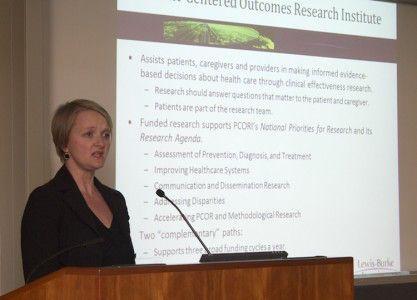
As federal cuts to research and education funding begin to take effect as part of the sequester, Boston University officials hosted two days of meetings Monday and Tuesday in conjunction with representatives from an outside consulting firm to inform faculty of the possible effects on research at BU.
BU Vice President and Associate Provost for Research Andrei Ruckenstein said during the event that BU’s total research grants over the next two to three years will likely remain the same as this year at about $356 million. However, he said he is concerned about funding down the road.
“The next two years, I don’t see much of a problem,” he said. “It’s after that that could be a problem. Nothing’s certain, and we just don’t know what we could afford to do.”
Three representatives from the firm Lewis-Burke Associates LLC outlined the funding cuts or increases for various organizations that tend to award research grants to BU to about 20 attendees on BU’s Medical Campus Tuesday afternoon.
While several grant-giving organizations will lose federal funding — which will result in decreased funding for research at universities — the numbers provided by Lewis-Burke’s representatives predict a balanced budget for universities over the next few years.
Erica Froyd, a Lewis-Burke consultant specializing in the National Institutes of Health, said the only problem with the current numbers is that they could not accurately account for the longer-term effects of sequestration.
“We’re still trying to figure this out,” Froyd said. “We know that NIH has been cut by five percent, and I think it’s been around five percent across most of the [funding] agencies, but we just don’t know what that’s going to mean in terms of research funding.”
During the meeting, Michael Ledford, another consulting representative, said funding from the U.S. Department of Defense as well as smaller, more specialized agencies will not and has not been jeopardized by sequestration.
He also said while the Department of Defense will continue to give grants for health and social science research, the grants will be given with a much more specific purpose.
Carla Jacobs, the third representative, said future research grants will not disappear, but will be awarded to applied projects as opposed to basic, less goal-oriented research.
In particular, the Substance Abuse and Mental Health Services Administration will fund projects focusing on one or more of eight categories it outlines, she said.
Jennifer Grodsky, vice president for BU Federal Relations in Washington, D.C., said this could be a crucial area of research funds in the future as psychological and neurological research are important to the BU community.
“There’s definitely a possibility BU could have issues in the future, but the areas that are such a part of what BU does well look to be consistent going into the future,” she said.
This forced focus on specific tasks concerned many of the faculty present at the meeting. Several faculty members said basic or creative research was at the core of what made BU’s researching process as renowned as it is.
While certain organizations would require applied research regardless of funding cuts, a large cause of this applied focus also relates to semantics, Ledford said.
“The people in Washington agree that if we don’t fund basic research, we shouldn’t be funding anything,” he said. “Agencies say ‘if everyone wants to fund it [applied research], they’ll fund it. If they want basic, they’ll fund basic’… It’s largely left to the [recipient] institutes to make these distinctions.”
Ruckenstein said universities often do the research they intend to do regardless of whether they are granted a basic or applied grant because of frustrating trends with how grants are awarded, so the responsibility to correct that lies on the universities.
“We actually need to be the ones who really come together and explain to the public the value of what we actually do,” he said. “We run after the money… [And] in the end it comes back to bite [us].”
Despite concerns at the federal and university levels, Grodsky said she is confident in BU’s ability to maintain its funding into the future because of its reputation as an important and successful research institution.
“The cutbacks mean there is less money available to apply for — not less quality [at BU,]” she said. “It just means we’ll have to be more competitive, and I think we can hold up.”
This is an account occasionally used by the Daily Free Press editors to post archived posts from previous iterations of the site or otherwise for special circumstance publications. See authorship info on the byline at the top of the page.



